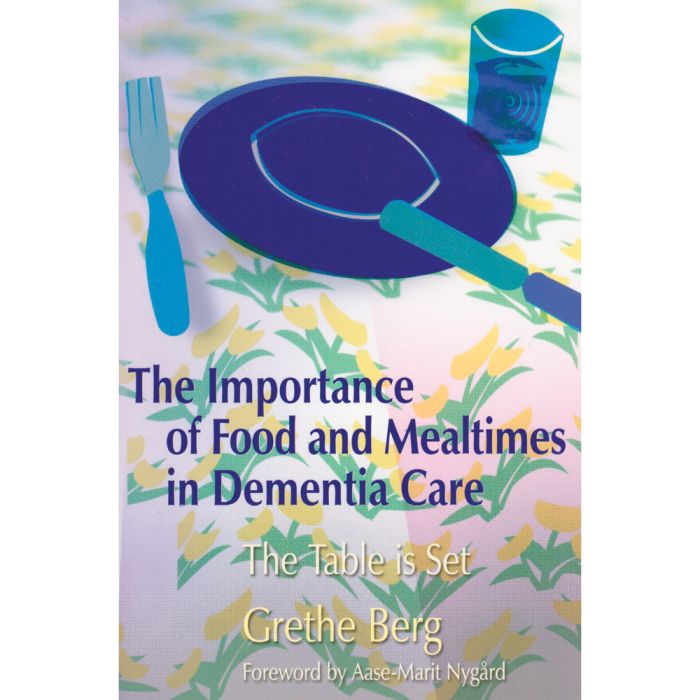The Importance of Food and Mealtimes in Dementia Care - Book
For those who have Dementia mealtimes can be disorientating, confusing or even distressing. Managing eating can also be difficult for family members or care staff who may be trying to increase food intake or support challenging behaviour.
This book outlines strategies ways of making this activity meaningful, stimulating and rewarding and provide opportunities for individuals to interact, socialise and reminisce. Assessment and planning examples are provided, with lots of advice on building design, interdisciplinary collaboration, staff participation. For care home managers and carers.
For those who have Dementia mealtimes can be disorientating, confusing or even distressing.
Managing eating can also be difficult for family members or care staff who may be trying to increase food intake or support challenging behaviour. This book outlines strategies ways of making this activity meaningful, stimulating and rewarding and provide opportunities for individuals to interact, socialise and reminisce.
Assessment and planning examples provided, with lots of advice on building design, interdisciplinary collaboration, staff participation.
Great for care home managers and carers.
"It is essential reading for care home managers and those responsible for commissioning dementia care services. The book, above all, expounds the value of time spent with the person with dementia, something of which many care staff have precious little."
Community Care Magazine
"It opens by explaining the symptoms of dementia and how they affect people's ability to manage their lives independently. It then discusses how mealtimes may be turned into a time of purposeful activity, before ending by showing how these ideas can be implemented."
Professional Social Work
"Mealtimes have a major social significance for the elderly. This can be all too easily forgotten by the busy clinician, who is used to grabbing a sandwich and a takeaway coffee to hurry through while sitting alone in front of a computer screen. Grethe Berg's book is therefore well worth the attention of considerate care staff and managers, as a reminder of the way in which they ought to be thinking of their clients."
Journal of Mental Health
"This book offers a broad discussion on the merits of different strategies to implement in the care of people with dementia during meal times and it would be of some value to any practitioner who has clinical interest in this area."
Mental Health Care Practice
"This book should be read by all those who are at all concerned about developing their understanding and practice of engaging with older people and their needs. It is an excellent example of writing that manages to maintain a challenging vision and earth this vision in suggestions for practice. The subject is simple enough how food and mealtimes can be used more consciously with people with dementia.
In taking this focus it opens up a range of daily problems faced by carers and others who attempt to connect with those living with dementia. Its attractiveness and intelligence clearly emerge out of the wisdom of practice-based experiences of an occupational therapist who works in Norway and has developed a specialist interest in the care of older people particularly in rehabilitation... Jessica Kingsley continues to be an innovative publisher advancing our commitment to developing old age care. This volume is a welcome addition to their list and should be widely bought and read."
Leveson Newsletter
"This is more than just a book about food, it provides valuable insights into the effects of living with dementia. In doing so, it also suggests useful strategies that can promote social stimulation, well being and confidence."
Community Care Magazine
"Through a range of care studies this book describes how mealtimes can be structured to become natural opportunities for meaningful activity between the carer and person with dementia. Numerous examples are given of how to assess and plan mealtimes so that both parties can find the experience congenial and stimulating. It considers the social significance of mealtimes and the carer's role in maintains the person with dementia's feelings of social attachment and well being. This book is well written and offers examples of good practice throughout."
Mental Health Care Practice
| Vat Exempt | No |
|---|---|
| Unit Qty | 0 |

